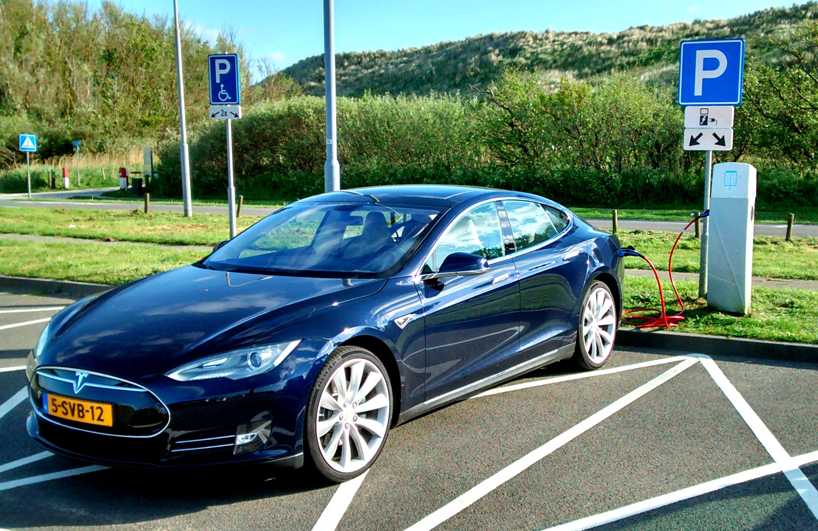Charging the environment in fifteen minutes or less
Model S of the Tesla motors line of four door vehicles. It is plugged into a charging station where it is gaining miles.
February 24, 2015
Climate change is one of the most prevalent, yet least talked about issues in the nation. Mother Nature is the ultimate elephant in the room. Many people choose to take the “ignorance is bliss” approach, because bad news is exactly that, bad. But when people choose that outlook, they’re not only blocking out the bad news about doomsday’s speedy approach, but they’re also keeping themselves disconnected from the great advances that are being made that just might significantly push back Armageddon.
Elon Musk is far from a household name. Is it a new particularly forest-like cologne? Is it a bathroom cleaner? Who knows. Not me, until a few months ago; and not you, until this. I first heard about him when my dad picked me up and began one of his signature rants about a documentary he recently saw, this one being an informative little flick on Elon Musk. To my surprise, it caught my attention. He talked and talked and talked about him, and while I got lost in the middle, I found my way back by the end and got the basics.
When Elon Musk was 12 years old he was already computer programming video games, selling one of them for $500. When he was in his 20’s he created PayPal, one of the most revolutionary advances in American-consumerist history. He then moved on to work with space equipment and designed the world’s first re-usable rocket. Basically, the guy is a genius. Literally. So why does this matter to the environment? Mother Nature doesn’t use PayPal, or go into space. But Musk has now turned his attention to the environment, creating perhaps the most promising products and plans that we’ve seen in years. He created a solar energy company that now provides solar panels for housing in more than 14 states. But the most important thing Musk has created to date, is Tesla Motors.
Electric cars aren’t new. They’ve been around for awhile. But why didn’t they end up catching on? They’re a bit dorky, but other than that, who wouldn’t want an electric car? Well, before Tesla was founded, electric cars were unrealistic because they could hardly be charged overnight and the mileage was terrible. But when the idea for Tesla came out, it was a game changer. The Tesla cars can be plugged in in your garage when you get home at night, and can be ready to go in the morning (assuming you’re not traveling more than 50-60 miles a day on your commute). My dad has put in an order for a Tesla car, and expects it in the next couple months. I asked him why he made the switch and he said, “It’s made in America, it’s the latest and greatest technology, Musk is my idol, and I’m all for the environment.” I don’t always agree with him, but it’s hard to rebuttal those points.
But even if you’re going on a road trip, have no fear. Not only can you charge your car in the privacy of your home, but if you need to travel more than 60 miles, there are also already Tesla charging stations (like gas stations) across the nation, far enough spread out that they’re not around every corner, but close enough together that you can go from station to station to get where you need to go. And how much will it cost us to fill up our car with green energy? How much? Nothing. The charging stations will charge your car with up to 300 miles worth of energy, in 10 minutes, for free. So maybe it isn’t a solution for today, or tomorrow, or even this year. But in a few years, you can bet on these cars dominating the highway, and now you’ll have seen it coming. Students already agree when they know what exactly Tesla is. I told Junior Cierra Berkley about them, and she said, “It sounds cool, I’d probably choose it over gas just because its cheaper in the long run. I don’t really see the down side.”
The big idea here, though, is that before reading this, the likelihood that you knew nothing about Tesla is much too high. No more “ignorance is bliss”, no more “too little too late”. It’s not too late. And regardless of what you think, it’s better to be informed than be ignorant. We live on this planet, we survive with it and if we make changes and stop the brutal exploitation of our Earth, we will thrive with it. Sometimes the most important tool is knowledge, and this is a prime example. Know about what’s going on, pay attention, and maybe one day we can hope to actually change things – to actually save the planet instead of just turning off the lights when we leave a room. To coexist with our home, or to abuse it. The difference is us.





